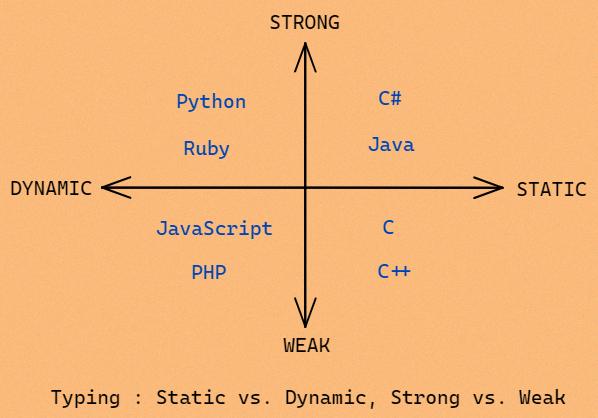Java is a popular programming language that is widely used today. It is known for its robustness, security, and portability. One of the key features of Java is its strong typing system. In this article, we will explore what it means for Java to be strongly typed and why it is important.
Java is a statically-typed language, which means that the data type of a variable needs to be declared before it can be used. This is in contrast to dynamically-typed languages such as Python and Ruby, whee the data type of a variable is determined at runtime. In Java, the data type of a variable is checked at compile time, which helps to catch errors early on in the development process.
The strong typing system in Java helps to ensure that variables are used correctly. For example, if you declare a variable as an integer, you cannot assign a string value to it. This helps to prevent errors such as type mismatches, which can lead to bugs and crashes in your code. By catching these errors early on in the development process, you can save time and effort in debugging and testing your code.
Another benefit of Java’s strong typing system is that it can help to improve the performance of your code. When the data type of a variable is known at compile time, the compiler can optimize the code to make it run more efficiently. This can lead to faster execution times and better overall performance.
In addition to these benefits, Java’s strong typing system also helps to make your code more readable and maintainable. By declaring the data types of your variables, you make it easier for other developers to understand your code and make changes to it. This can be especially important in large-scale projects where multiple developers are working on the same codebase.
Despite these benefits, some developers argue that Java’s strong typing system can be too restrictive and make the language more difficult to use. They argue that dynamically-typed languages such as Python and Ruby are more flexible and allow for faster development cycles. However, it is important to remember that strong typing can help to catch errors early on in the development process, which can save time and effort in the long run.
Java is a strongly-typed language that offers many benefits to developers. Its strong typing system helps to catch errors early on in the development process, improve performance, and make code more readable and maintainable. While some developers may prefer dynamically-typed languages, it is important to consider the benefits of strong typing when choosing a programming language for your project.
Is Java Strongly Typed Or Dynamically Typed?
Java is a strongly typed programming language, which means that its variables must have a declared data type bfore they can be assigned values. This type checking is performed at compile-time, allowing the compiler to catch type-related errors before the program is run. This approach ensures that Java programs are more reliable and less prone to errors, as it enforces strict adherence to data types.
On the other hand, dynamic typing is a feature of programming languages where the data type of a variable is determined at runtime, rather than at compile-time. This means that variables in dynamically typed languages like Python and Ruby can be assigned any value, regardless of its data type. While dynamic typing offers more flexibility, it can also lead to more errors and make it more difficult to catch them.
Java is a strongly typed programming language, which means that it enforces strict adherence to data types and performs type checking at compile-time.

Is Java More Strongly Typed Than C?
Java is generally considered to be more strongly typed than C. This is because Java has stricter rules for type checking and automatic type conversions, which helps to prevent many common programming errors.
In Java, all variables must be declared with a specific data type, and the type of a variable cannot be changed once it has been declared. Additionally, Java does not allow implicit conversions between different types of data, which can help to catch errors that might otherwise go unnoticed in C.
In contrast, C is more permissive with regard to type conversions and allows variables to be declared without a specific data type. This can make it easier to write code quickly, but can also lead to subtle bugs and errors if not used carefully.
It’s worth noting, however, that the term “strongly typed” is somewhat subjective and can mean different things to different people. Some developers may consider C to be strongly typed based on its strict rules for pointer manipulation and memory management, while oters may focus more on its looser type checking and implicit conversions.
While both Java and C have their strengths and weaknesses when it comes to type safety, it’s generally agreed that Java’s stricter rules and type checking make it a more strongly typed language than C.
Is Java More Strongly Typed Than Python?
Java is more strongly typed than Python. In Java, all variables must be declared with a specific data type, and once a variable is declared with a particular type, it cannot be assigned a value of a different type. This means that Java enforces strict type-checking at compile-time, which helps catch errors early on in the development process and makes the code more reliable and robust.
On the other hand, Python is dynamically typed, which means that variables do not have a specific data type and can be assigned values of any type at runtime. This makes Python more flexible and easier to use for rapid prototyping and scripting, but it also means that type errors may only be caught at runtime, which can be a source of bugs and errors.
To summarize, while both Java and Python are strongly typed, they differ in the level of strictness in their type-checking. Java is more strict and enforces type-checking at compile-time, while Python is more flexible and alows for dynamic typing at runtime.
Why Is C C++ And Java Not Strongly Typed?
C, C++ and Java are often considered not strongly typed languages because they allow type-casting, which can lead to errors and inconsistencies. Type-casting is the process of converting one type of data to anothr type, and it can be done implicitly or explicitly. In C, for example, one can easily cast an integer variable to a pointer type, which can lead to invalid memory access and other issues if not done carefully.
Additionally, C and C++ have a weak type system, meaning that they do not provide much type checking at compile time. This allows developers to use pointers and other low-level features, but it also makes it easier to introduce bugs and security vulnerabilities.
Java, on the other hand, is often considered not strongly typed because it allows for dynamic type checking at runtime, which can result in unexpected behavior if not handled correctly. Java also has a concept of “type erasure”, where generic types are compiled into a single bytecode representation, which can lead to type mismatches and errors.
While C, C++ and Java have their strengths and weaknesses, their lack of strong typing can make them more difficult to use in some situations and can lead to bugs and security issues if not used carefully.

Conclusion
Java is considered to be a strongly-typed language due to its strict adherence to static typing. This means that variables must be declared with their data type beore they can be assigned values. Java’s strong typing helps to catch errors early in the development process and improves the overall reliability and stability of the code. While the terms “strongly typed” and “weakly typed” can be subjective and difficult to define, Java’s strict adherence to static typing sets it apart from other languages such as Ruby, Perl, and Matlab, which are considered to be more weakly typed. Java’s strong typing is an important feature that helps developers write more reliable and efficient code.
